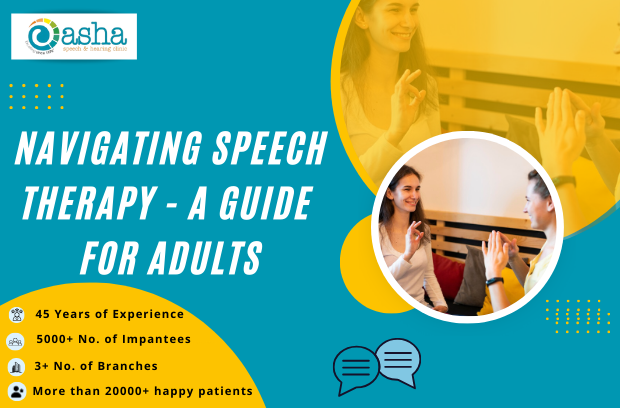- June 11, 2025
- Asha Agarwal
- Comment: 0
- blog
Communication is an essential component of human bonding that helps to influence relationships, shape experiences, and improve the overall quality of life. Especially, for some adults, speech and language issues can be frustrating and stand as a barrier to developing true connections. Instead of worrying, such individuals may get adult speech therapy to express their thoughts clearly and confidently. If you are interested to know about speech therapy for adults, read this blog post.
Here, we have covered the most effective Speech Therapy for Adults along with the tips on how they can improve communication and heal from trauma. Additionally, we have also shared why an adult may require speech therapy and how adult speech therapy works.
Role of Adult Speech Therapy
Speech therapy for adults helps them to improve their communication and cognitive abilities. In specific, adult speech therapy focuses on improving attention, concentration, direction, and word recollection. A good speech therapy program includes cognitive brain exercises and compensatory measures to improve communication skills. After thoroughly examining an individual, speech therapists will utilize a variety of speech therapy as corrective techniques.
Why Might Adults Need Speech Therapy?
Usually, many speech problems start in childhood, but there are a variety of other reasons why an adult may experience speech difficulties. The following are certain circumstances that may require adult speech therapy.
- Dementia
- Laryngeal cancer
- Oral cancer
- Stroke
- Brain injury
- Respiratory conditions
- Aging
- Autism
- Surgery
- Accent modification
These are a few reasons why Speech Disorders can develop later in life. Still, speech difficulties that were not addressed in childhood may persist into adulthood, prompting an adult to seek speech therapy.
Speech Disorders and Conditions Treated by Adult Speech Therapy
Generally, speech therapy treats the following conditions and speech disorders in adults
- Stuttering
- Aphasia
- Resonance Disorders
- Apraxia
- Articulation Disorders
- Dysarthria
- Expressive Disorders
- Fluency Disorders
- Receptive Disorders
Know Everything about the Adult Speech Therapy Process
When adults seek speech therapy, the Speech Language Pathologists (SLPs) or Speech therapists will undergo the following.
- Assesses the individual and identifies the root cause of the speech problem. A thorough evaluation will help SLPs to develop an effective personalized therapy plan.
- Examine the speech and language skills of an individual and find out the areas for improvement.
- By collaborating with the patient, the SLPs set realistic goals. It can be improving voice quality, refining articulation, or enhancing language comprehension.
- Employs interactive and evidence-based methods such as articulation exercises, language drills, and vocal exercises. Especially, to make sessions exciting, SLPs encourage active participation in the learning process and assign tasks that are useful for the patient.
- Motivates the patients to consistently practice the exercises outside the therapy room and incorporate them into daily communication habits for improvement.
- Tracks the progress regularly and modifies the therapy plan accordingly.
- For additional support, SLPs integrate technology into modern adult speech therapy.
Understand How Speech Therapy for Adults Works
Adults might benefit from speech therapy in several ways. Treatment options can differ depending on the causes of speech problems and what the goals are for the procedure. Adult speech therapy options frequently involve the following.
Target Selection
Selecting a target entails focusing on particular sounds that you may be finding particularly challenging. For instance, your speech therapist might concentrate specifically on sounds that cause you to lisp when pronouncing the letter “S.” Your speech therapist may identify and concentrate on the word or portion of a sentence that is causing your stuttering.
Contrast Therapy
In contrast therapy, words are practiced in pairs to highlight their distinctions. During contrast therapy, a speech therapist might match patients as “dough” and “show,” or as “beat” and “feet.” Although these words sound different, they have similar spellings. With some speech and language disorders, using these pairs to draw distinctions can be helpful.
Contextual Utilization
Speech activities are contextualized using specific syllables. After brain damage or degeneration, word structures are frequently broken up into more manageable components to aid in relearning or reinforcement.
Oral-motor Therapy
Oral-motor therapy enhances language and communication abilities by targeting the facial and oral muscles. Speech therapists provide exercises and tools to help with the important task of strengthening and fine-tuning the muscles of the throat, tongue, lips, and jaw.
Activities and Exercises Involved in Adult Speech Therapy
Speech therapy for adults typically focuses on developing or refining certain skill sets like strengthening the mouth-brain synchronization. The following are a few significant speech activities and exercises that are performed in speech therapy for adults.
Facial Exercise
Mastering and regulating facial expressions can enhance motor abilities. Speech therapists typically employ a variety of exercises, including lip-puckering, tensing certain muscles, and many others.
Breathing Exercise
An adult may be asked to perform a few breathing exercises by a speech therapist to help resolve the problems.
Tongue and Mouth Exercise
Motions and workouts help strengthen the mouth and tongue region. They aid in developing coordinated tongue movement in the tongue muscles.
Reading Aloud
Reading aloud helps improve the connection between the brain and mouth if a person has a specific speech issue that limits their ability to move their mouth and tongue appropriately.
Word Games
Games that test cognitive abilities and preserve cognitive functioning include word searches, crosswords, memory games, and puzzles.
Swallowing Exercise
Speech and swallowing problems can be brought on by medical conditions like Parkinson’s, mouth cancer, and abrupt stroke. To assist a person with these issues, an SLP may use exercises like sentence production, repetition of consonants and vowels, phonological processing, and so on.
Conclusion
Adult speech therapy offers various advantages for people who are experiencing problems with communication in their daily lives. It promotes higher self-esteem, the ability to perceive and express ideas, feelings, and thoughts, and increased vocal quality, among other benefits. If you are seeking high-quality speech therapy for adults, book an appointment at Asha Speech and Hearing Clinic. We have the best speech therapists on our team to provide effective speech therapy as per the needs of individuals and improve their quality of living.
About Author
Asha Agarwal
Chief Audiologist & Director, Asha Speech and Hearing Clinics
Asha Agarwal, founder of ASHA Clinic, has been dedicated to transforming lives since 1996 through early intervention and personalized care in speech and hearing. Her mission: “Give joy of hearing and speaking by breaking barriers of silence.





